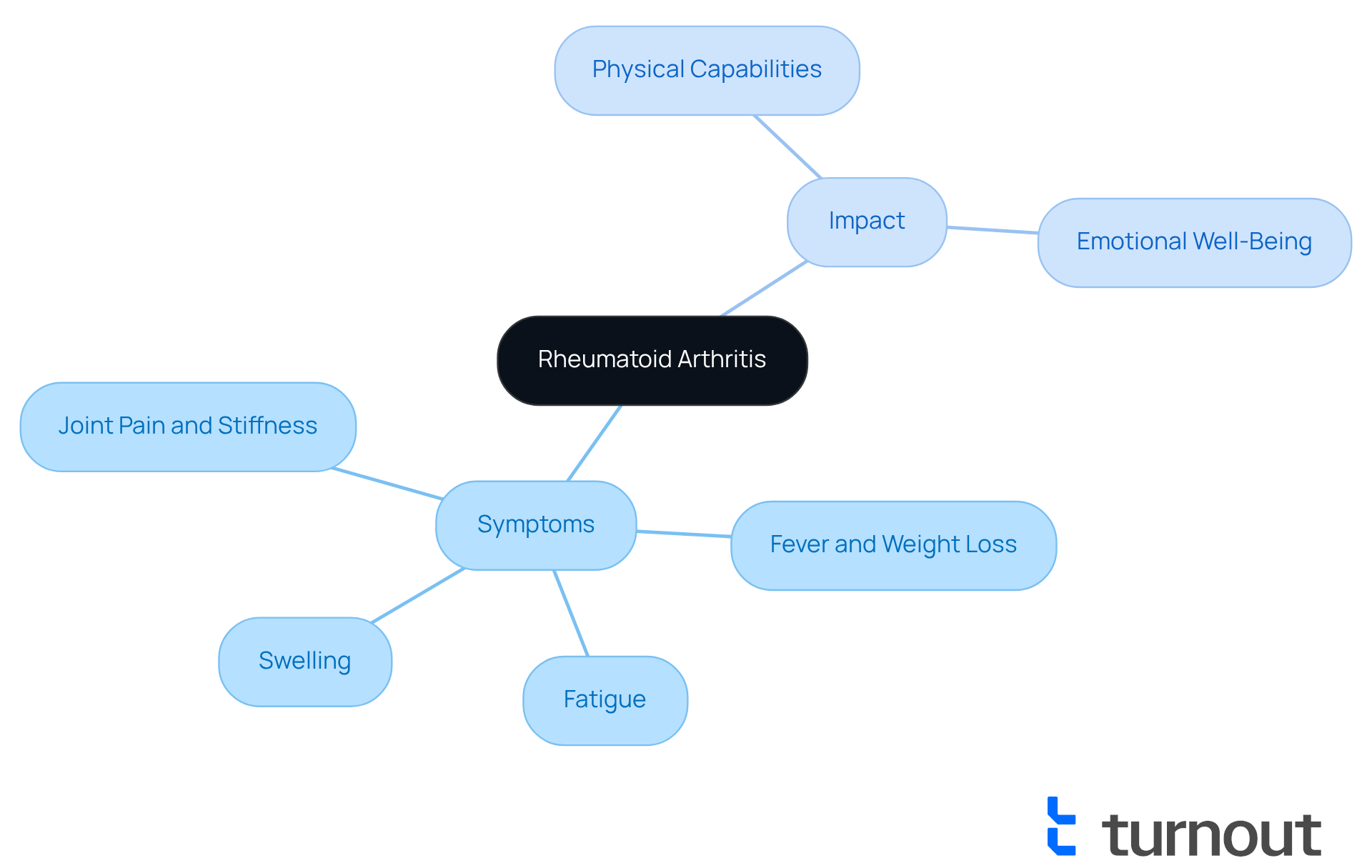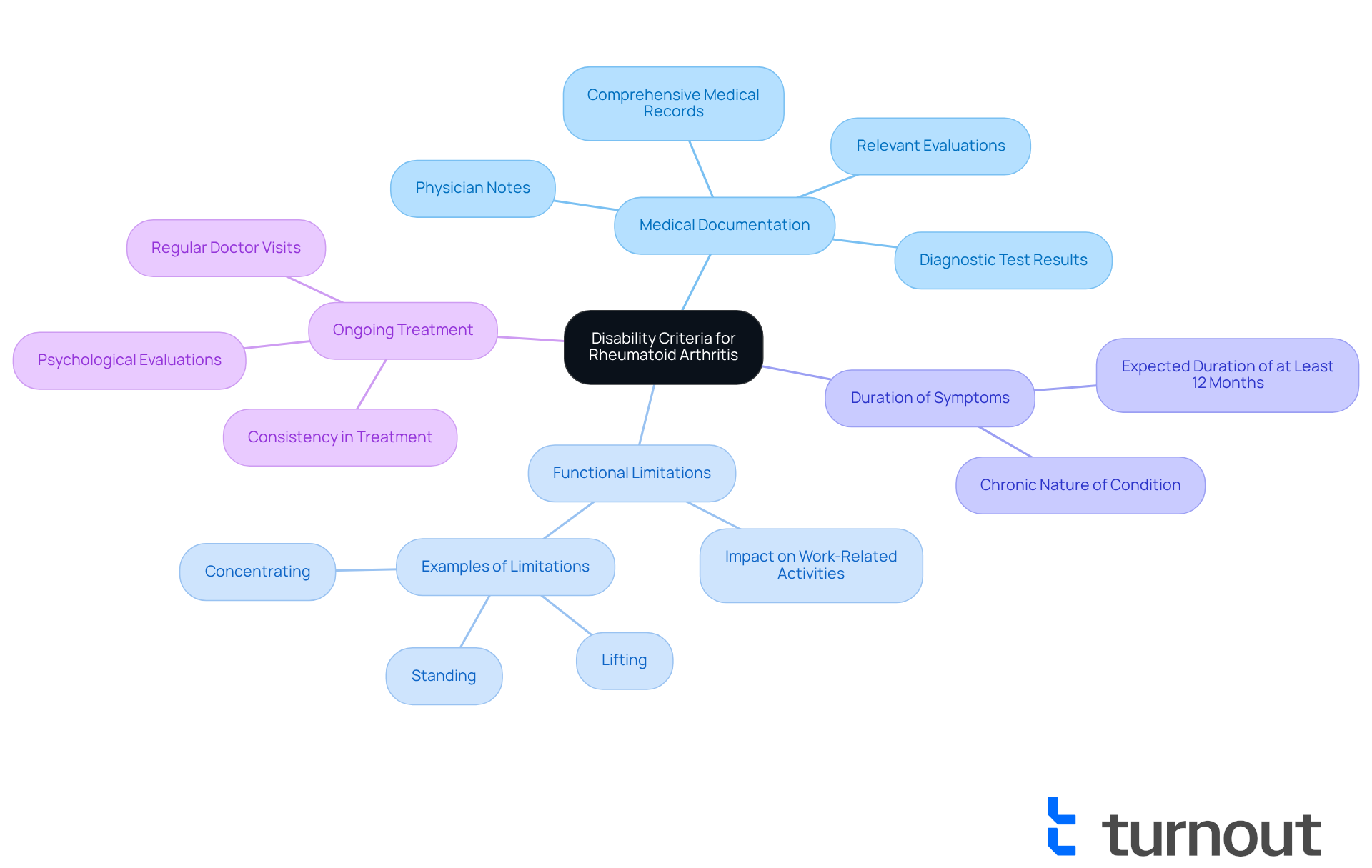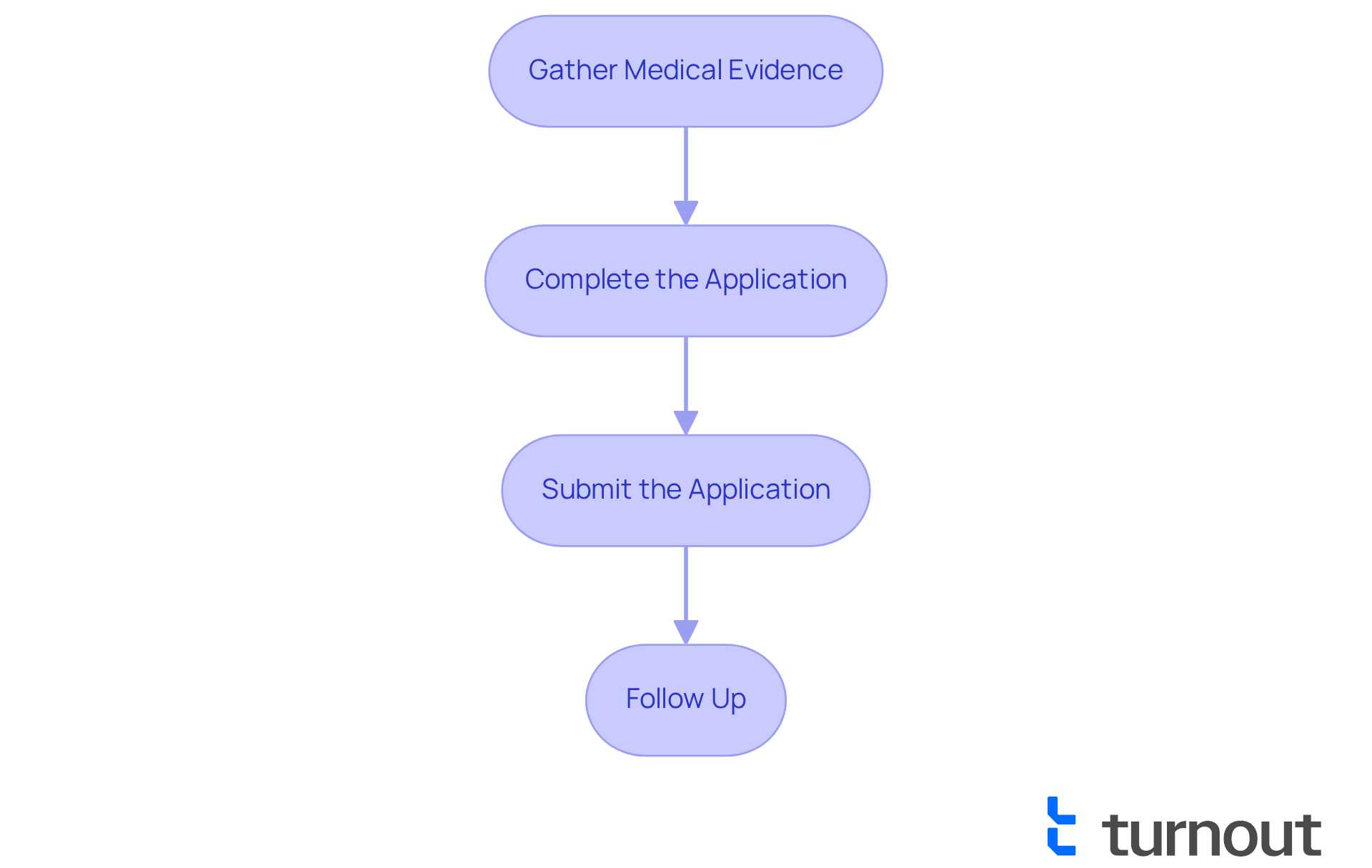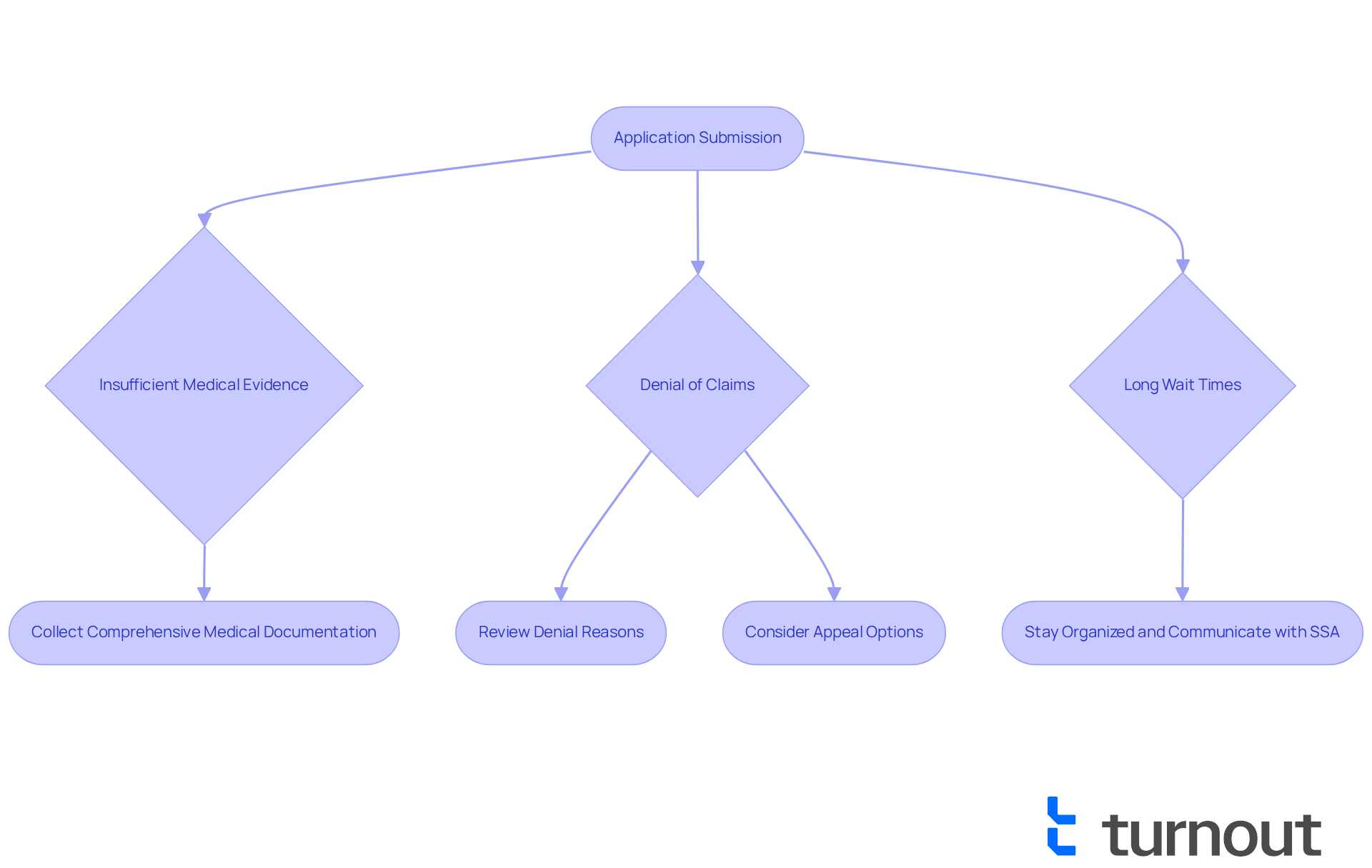Overview
Rheumatoid arthritis can be a challenging condition, and we understand how it affects your life. If you are seeking disability benefits, it's essential to provide sufficient medical documentation that demonstrates the severity of your condition and its impact on your ability to work.
Meeting the Social Security Administration's criteria is crucial for a successful claim. This includes detailed medical records and evidence of functional limitations. Many initial applications are denied due to inadequate proof, which can be disheartening. Remember, you are not alone in this journey; we’re here to help you navigate the process.
Take the time to gather all necessary documentation. It can make a significant difference in your claim's outcome. If you have any questions or need support, please reach out. You deserve assistance that acknowledges your struggles and helps you find the relief you need.
Introduction
Rheumatoid arthritis (RA) is more than just a condition; it can be a life-altering challenge that affects countless individuals in their daily lives. We understand that grappling with its debilitating symptoms can be overwhelming, and the question of whether RA qualifies for disability benefits becomes crucial for many.
This article delves into the intricacies of navigating the Social Security Administration's disability criteria. Here, we aim to provide essential insights and guidance for those seeking support. It's common to feel uncertain about the process, especially when the path to securing these benefits is often fraught with obstacles.
So, what steps can you take to enhance your chances of approval and overcome the common pitfalls in the application process? Together, we will explore the answers, ensuring you feel empowered and informed on this journey.
Understand Rheumatoid Arthritis: Symptoms and Impact
Rheumatoid arthritis (RA) is a chronic inflammatory disorder that primarily affects joints, leading to pain, swelling, and potential joint damage. We understand that living with RA can be daunting, as it brings several common symptoms:
- Joint Pain and Stiffness: Particularly noticeable in the morning or after periods of inactivity.
- Fatigue: A persistent feeling of tiredness that can hinder your daily activities.
- Swelling: Inflammation around joints, which can limit your mobility.
- Fever and Weight Loss: These systemic symptoms can also occur, indicating the severity of the condition.
The impact of RA can be profound, affecting not only your physical capabilities but also your emotional well-being. It's common to feel overwhelmed when everyday tasks become challenging, impacting your ability to maintain employment or engage in social activities. Understanding these symptoms is the first step in determining if one can answer the question of whether rheumatoid arthritis qualifies for disability benefits, as they directly relate to your ability to work and perform daily functions.
At our organization, we’re here to help you navigate the complexities of applying for Social Security Disability (SSD) benefits. Our skilled non-legal advocates are dedicated to supporting you throughout the SSD claims journey, ensuring you comprehend your rights and choices. Remember, while Turnout is not a law firm and does not provide legal representation, we are committed to offering assistance in other areas, such as tax debt relief, to help you access the financial support you need.

Identify Disability Criteria for Rheumatoid Arthritis
If you’re seeking disability benefits due to rheumatoid arthritis, it’s important to understand whether rheumatoid arthritis qualifies for disability according to the specific criteria set by the Social Security Administration (SSA). We know that this process can feel overwhelming, but you’re not alone. Here are some key factors to consider:
-
Medical Documentation: Having comprehensive medical records is essential. These should detail your diagnosis, treatment history, and ongoing symptoms. This includes physician notes, diagnostic test results, and any relevant evaluations. It’s crucial that your story aligns with that of your healthcare provider to build trust in your submission.
-
Functional Limitations: You’ll need to provide evidence showing how rheumatoid arthritis limits your ability to perform work-related activities, like lifting, standing, or concentrating. Clear documentation outlining the impact of your condition on daily tasks is necessary. We encourage you to ask your healthcare providers to specify the limitations caused by rheumatoid arthritis.
-
Duration of Symptoms: The SSA requires that your condition is expected to last at least 12 months or result in death, highlighting the chronic nature of rheumatoid arthritis.
The SSA has a specific listing for inflammatory arthritis that considers whether rheumatoid arthritis qualifies for disability. You’ll need to provide medical evidence illustrating the severity of your condition and its effects on your daily life to determine if rheumatoid arthritis qualifies for disability. It’s concerning to note that nearly 60% of initial disability requests are rejected due to inadequate medical proof. This underscores the importance of preparing a robust submission that meets these standards. Regular doctor visits and consistent treatment not only validate the seriousness of your condition but also enhance your chances of approval. Claimants who maintain regular treatment are significantly more likely to be approved according to SSA guidelines.
Understanding these requirements is essential for successfully navigating the application process. Additionally, if you’re experiencing depression or anxiety alongside your physical condition, including psychological evaluations can be beneficial. It’s also important to have comprehensive medical records covering the entire period of disability to support your request.
We’re here to help. Participation offers access to skilled non-legal advocates who can assist you in navigating the complexities of the SSD application process. They ensure that all required documentation is prepared and submitted accurately. This support can be crucial in increasing the likelihood of a successful claim. Turnout provides tools and services designed to simplify the submission process and enhance results for applicants. Remember, you are not alone in this journey.

Navigate the Application Process for Disability Benefits
Navigating the application process for disability benefits can feel overwhelming, but you don’t have to face it alone. Here are several key steps to guide you through:
-
Gather Medical Evidence: Start by collecting all relevant medical records, including your diagnosis, treatment plans, and notes from your healthcare providers. This foundational step is crucial in supporting your claim.
-
Complete the Application: Next, fill out the SSA's application form with detailed information about your condition and how it affects your daily life. Remember, the organization is here to assist you, ensuring you understand what information is needed to strengthen your application. It's important to note that while they provide support, they are not a legal practice and do not offer legal counsel.
-
Submit the Application: You can submit your application online, by phone, or in person at a local SSA office. Make sure all necessary documents are included. Trained non-professional advocates can help you during this step, ensuring your submission is thorough and accurate.
-
Follow Up: After submitting your application, keep track of its status and respond promptly to any requests for additional information from the SSA. The organization continues to offer support, helping you navigate any complexities that may arise.
By following these steps and utilizing available resources, you can ensure that your application is submitted accurately and effectively. This not only enhances your chances of approval but also reinforces that you are not alone in this journey. We're here to help you every step of the way.

Overcome Challenges in Disability Claims for Rheumatoid Arthritis
Many applicants encounter significant hurdles when trying to find out if rheumatoid arthritis does qualify for disability benefits. We understand that these challenges can be overwhelming. Key difficulties include:
-
Insufficient Medical Evidence: It is crucial to compile comprehensive medical documentation that clearly illustrates the severity of your condition. This includes detailed records of medical appointments, test results, and personal statements that highlight how rheumatoid arthritis affects daily life. Documenting the dates of medical appointments and keeping a journal to track obstacles faced due to your health can provide essential evidence.
-
Denial of Claims: A denial does not signify the end of your journey. It's common to feel discouraged, but reviewing the reasons for the denial carefully can be empowering. Consider appealing the decision. Many initial claims are rejected due to a lack of evidence or failure to meet specific criteria. Gathering additional documentation and possibly seeking assistance from Turnout's trained advocates can significantly bolster your case. Remember, there are four levels of appeal available: Reconsideration, Hearing by an Administrative Law Judge, Review by the Appeals Council, and Federal Court review.
-
Long Wait Times: The application procedure can be protracted, with reconsideration in Ohio typically taking 2-4 months and hearings potentially extending to 6-12 months. Staying organized and ensuring clear communication with the Social Security Administration (SSA) is crucial for monitoring your application's progress.
By comprehending these obstacles and preparing efficiently, applicants can manage the process with increased confidence and improve their likelihood of understanding if rheumatoid arthritis does qualify for disability benefits they deserve. Importantly, Turnout is not a law firm and does not provide legal representation. For instance, Amy Farrell, who faced an initial denial due to insufficient evidence, successfully appealed her case after gathering more documentation and receiving support from advocates at Turnout. Her experience underscores the importance of persistence and thorough preparation in overcoming claim denials. Remember, you are not alone in this journey, and we are here to help.

Conclusion
Rheumatoid arthritis (RA) presents significant challenges for those affected, especially when it comes to qualifying for disability benefits. We understand that navigating this chronic condition can be overwhelming, and recognizing its symptoms is crucial for individuals seeking financial support. The journey to determine if rheumatoid arthritis qualifies for disability involves navigating complex criteria set by the Social Security Administration (SSA) and preparing comprehensive documentation that accurately reflects the impact of the disease on daily life.
Key factors such as:
- Medical documentation
- Functional limitations
- Duration of symptoms
play a pivotal role in the application process. By gathering thorough medical evidence and maintaining regular communication with healthcare providers, applicants can enhance their chances of approval. It's common to feel discouraged by challenges such as insufficient evidence and claim denials, but recognizing these obstacles can empower individuals to persist in their pursuit of necessary assistance.
Ultimately, the process of applying for disability benefits due to rheumatoid arthritis may seem daunting, but support is available. Engaging with skilled advocates can simplify the application journey and provide reassurance. We encourage those affected to advocate for themselves and seek the help they need to navigate these complexities, ensuring they receive the benefits that can significantly improve their quality of life. Remember, you are not alone in this journey.
Frequently Asked Questions
What is rheumatoid arthritis (RA)?
Rheumatoid arthritis (RA) is a chronic inflammatory disorder that primarily affects joints, leading to pain, swelling, and potential joint damage.
What are the common symptoms of rheumatoid arthritis?
Common symptoms of RA include joint pain and stiffness (especially in the morning or after inactivity), fatigue, swelling around joints, fever, and weight loss.
How does rheumatoid arthritis impact daily life?
RA can significantly affect physical capabilities and emotional well-being, making everyday tasks challenging, which may impact employment and social activities.
Can rheumatoid arthritis qualify for disability benefits?
Understanding the symptoms of RA is crucial in determining if it qualifies for disability benefits, as these symptoms directly relate to one's ability to work and perform daily functions.
How can I get assistance with applying for Social Security Disability (SSD) benefits?
Our organization offers support through skilled non-legal advocates who can help you navigate the complexities of applying for SSD benefits and understand your rights and choices.
Does the organization provide legal representation for SSD claims?
No, the organization does not provide legal representation, as it is not a law firm, but it is committed to offering assistance in other areas, such as tax debt relief, to help you access financial support.




